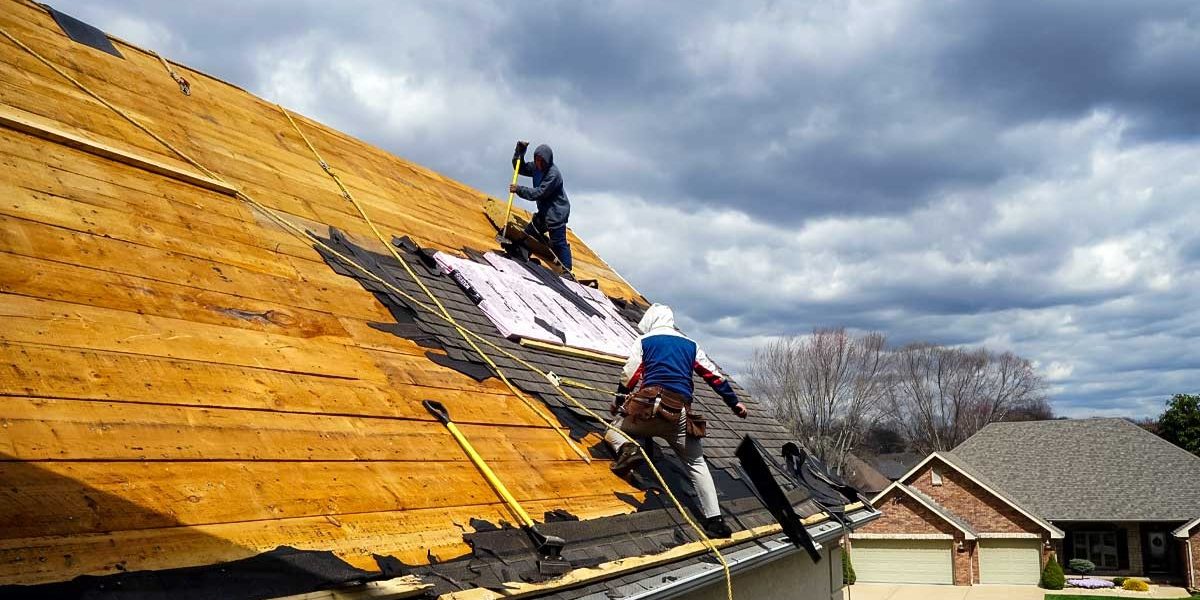Residential roof replacement is a crucial aspect of home maintenance that ensures your property remains protected and retains its value. Whether you’re dealing with an aging roof, storm damage, or just planning an upgrade, understanding the ins and outs of roof replacement can help you make informed decisions. This comprehensive guide covers everything you need to know about residential roof replacement, from assessing your needs to maintaining your new roof.
Understanding Roof Replacement
What is Residential Roof Replacement?
Residential roof replacement involves removing an old or damaged roof and installing a new one. Unlike roof repairs, which address specific issues, replacement entails a complete overhaul. This process is essential when your roof is beyond repair or when you want to upgrade to more durable or energy-efficient materials. Replacement ensures that your home remains safe from the elements and improves its overall appearance.
Signs You Need a Roof Replacement
Recognizing the signs that indicate a need for residential roof replacement is vital. Look for visible damage such as missing or curled shingles, significant granule loss, and leaks inside your home. Structural issues like sagging or a compromised roof deck also signal that replacement might be necessary. Frequent repairs can indicate that a full replacement is more cost-effective in the long run.
Benefits of Roof Replacement
Replacing your roof offers several benefits. First, it enhances your home’s property value, making it more attractive to potential buyers. A new roof improves energy efficiency by better insulating your home and reducing heating and cooling costs. Additionally, a new roof provides superior protection from the elements, ensuring that your home remains dry and secure.
Assessing Your Roofing Needs
Roof Inspection Process
Before undertaking residential roof replacement, a thorough inspection is essential. A professional roofing contractor will assess the condition of your current roof, checking for damage, wear, and structural issues. This inspection helps determine whether a replacement is necessary and identifies any underlying problems that need addressing. Regular inspections, ideally every few years or after severe weather events, can help you stay ahead of potential issues.
Determining the Right Time for Replacement
Choosing the right time for residential roof replacement can impact the process’s success and cost. Ideally, replace your roof during mild weather conditions to ensure optimal installation. Spring and fall are often the best times, as extreme temperatures can affect the materials’ performance. Consider scheduling your replacement when your roof shows signs of age or damage, rather than waiting for problems to worsen.
Choosing the Right Roofing Material
Selecting the right roofing material is crucial for both durability and aesthetics. Asphalt shingles are a popular choice due to their affordability and ease of installation. Metal roofs offer longevity and energy efficiency, while tile and slate roofs provide a distinctive look and excellent durability. Evaluate factors such as your local climate, budget, and home style to choose the best material for your residential roof replacement.
Selecting a Roofing Contractor
How to Find a Qualified Roofing Contractor
Finding a qualified roofing contractor is essential for a successful residential roof replacement. Start by researching local contractors and checking their reviews and ratings. Verify their licenses and insurance to ensure they meet industry standards. A reputable contractor will provide detailed information about their services and past projects, giving you confidence in their ability to handle your replacement.
Questions to Ask Potential Contractors
When interviewing potential contractors, ask questions to gauge their expertise and reliability. Inquire about their experience with residential roof replacement, the types of materials they recommend, and the warranty they offer. Request a detailed cost estimate and clarify payment terms to avoid misunderstandings. A thorough discussion will help you choose a contractor who meets your needs and expectations.
Red Flags to Watch For
Be vigilant for red flags when selecting a roofing contractor. Avoid contractors who provide unusually low bids, as this may indicate subpar materials or workmanship. Ensure they have proper credentials and a transparent approach to their work. Poor communication, lack of references, or reluctance to provide a written contract can also signal potential issues.
Understanding the Roof Replacement Process
Initial Consultation and Estimate
The initial consultation for residential roof replacement involves discussing your needs with the contractor and receiving an estimate. During this meeting, the contractor will assess your current roof, discuss material options, and provide a detailed cost estimate. Review the estimate carefully, including the scope of work and any additional costs, before signing the contract.
Preparation for Roof Replacement
Proper preparation is key to a smooth residential roof replacement process. Prepare your home and yard by removing any items that could be damaged during the installation. Ensure that the contractor has clear access to your roof and that any pets or children are kept away from the work area. On the day of replacement, expect some noise and disruption as the old roof is removed and the new one is installed.
Installation Process
The installation of a new roof involves several steps. First, the old roof is removed, and any damaged decking is repaired or replaced. Next, the new roofing material is installed, starting with underlayment and followed by the shingles or other chosen material. The process also includes sealing and flashing to ensure proper water protection. The contractor will clean up the area and conduct a final inspection to ensure everything is installed correctly.
Cost Factors and Budgeting
Typical Costs of Roof Replacement
The cost of residential roof replacement varies based on several factors, including the size of your roof, the type of material used, and the complexity of the installation. On average, asphalt shingles are more affordable compared to metal or tile roofs. Regional cost variations can also affect pricing, so it’s important to get multiple estimates and understand what is included in the total cost.
Financing Options
If you need to finance your residential roof replacement, several options are available. You can consider home improvement loans, credit cards, or payment plans offered by roofing companies. Each option has its pros and cons, so evaluate them based on interest rates, repayment terms, and eligibility requirements. Choose the financing solution that best fits your budget and financial situation.
Budgeting Tips
Effective budgeting for residential roof replacement involves planning for both expected and unexpected costs. Include costs for materials, labor, and any additional services such as disposal of old roofing. Set aside a contingency fund for unforeseen issues that may arise during the project. By carefully managing your budget, you can ensure a smooth replacement process without financial strain.
Maintaining Your New Roof
Routine Maintenance Tips
Maintaining your new roof is essential for its longevity and performance. Regular maintenance includes inspecting the roof for damage, cleaning gutters, and removing debris. Ensure that roof vents and flashings are intact and functioning properly. Regular maintenance helps prevent issues and extends the lifespan of your roof.
Cleaning and Care
Proper cleaning and care are crucial for keeping your roof in good condition. Avoid using harsh chemicals or pressure washers that can damage roofing materials. Instead, use a gentle cleaning solution and a soft brush to remove dirt and moss. Regularly check for and address any signs of wear or damage to maintain your roof’s appearance and functionality.
Handling Repairs and Warranty Claims
Address minor repairs promptly to prevent further damage and costly repairs. Familiarize yourself with your roof’s warranty and the process for filing a claim if needed. Work with your contractor to address any issues covered under the warranty and ensure that all repairs are completed to your satisfaction.
Impact on Home Value and Insurance
How Roof Replacement Affects Home Value
A new roof can significantly impact your home’s value and appeal. Potential buyers often view a new roof as a major benefit, reducing the likelihood of future issues and improving curb appeal. A well-maintained and modern roof can enhance your home’s resale value and make it more attractive to prospective buyers.
Insurance Considerations
Updating your home insurance policy after a residential roof replacement is essential. Inform your insurance provider about the new roof and any changes in coverage. Understanding your policy’s coverage for roof replacement and damage ensures that you are adequately protected in case of future incidents. Review your policy regularly to ensure it meets your current needs.
Environmental Considerations
Eco-Friendly Roofing Options
Consider eco-friendly roofing options for a sustainable residential roof replacement. Materials such as metal, recycled shingles, and cool roofs can reduce environmental impact and enhance energy efficiency. Green roofing solutions, including living roofs or solar panels, offer additional environmental benefits and contribute to a more sustainable home.
Disposal and Recycling
Proper disposal and recycling of old roofing materials are important for minimizing environmental impact. Many roofing companies offer recycling services for asphalt shingles and other materials. Ensure that your contractor follows proper disposal practices and explores recycling options to reduce waste and promote sustainability.
Energy Efficiency Benefits
A new roof can improve your home’s energy efficiency by providing better insulation and reducing heat transfer. Choose energy-efficient materials to enhance your roof’s performance and lower your energy bills. Improved insulation helps maintain comfortable indoor temperatures and reduces the need for heating and cooling, leading to long-term savings.
FAQs
1. What are the signs that I need a roof replacement?
Signs include missing or damaged shingles, leaks, and frequent repairs. Structural issues like sagging also indicate the need for replacement.
2. How long does a roof replacement take?
The duration varies depending on roof size and complexity. Typically, residential roof replacement takes a few days to a week.
3. How much does residential roof replacement cost?
Costs depend on factors such as material type, roof size, and complexity. On average, asphalt shingles are less expensive than metal or tile roofs.
4. What materials are best for roof replacement?
Common materials include asphalt shingles, metal, and tile. The best choice depends on your budget, climate, and home style.
5. How can I choose the right roofing contractor?
Research local contractors, check reviews, and verify licenses and insurance. Ask for detailed estimates and inquire about warranties.
6. When is the best time of year to replace my roof?
Spring and fall are ideal for residential roof replacement due to mild weather conditions that facilitate installation.
7. What should I expect during the roof replacement process?
Expect removal of the old roof, installation of new materials, and some noise and disruption. The contractor will handle the cleanup and final inspections.
8. How can I maintain my new roof?
Regular maintenance includes inspecting for damage, cleaning gutters, and removing debris. Address minor repairs promptly to prevent issues.
9. Will a new roof increase my home’s value?
Yes, a new roof can enhance your home’s value, improve curb appeal, and attract potential buyers.
10. How do I handle insurance claims for roof replacement?
Inform your insurance provider about the new roof, review coverage details, and file claims as needed. Work with your contractor to address any covered issues.
Conclusion
Residential roof replacement is a significant investment that enhances your home’s protection, value, and energy efficiency. By understanding the replacement process, selecting the right materials, and choosing a qualified contractor, you can ensure a successful project. Regular maintenance and proper care will help extend the life of your new roof and keep your home safe and comfortable. For personalized advice and expert assistance, consult with a professional roofing contractor to address your specific needs.







